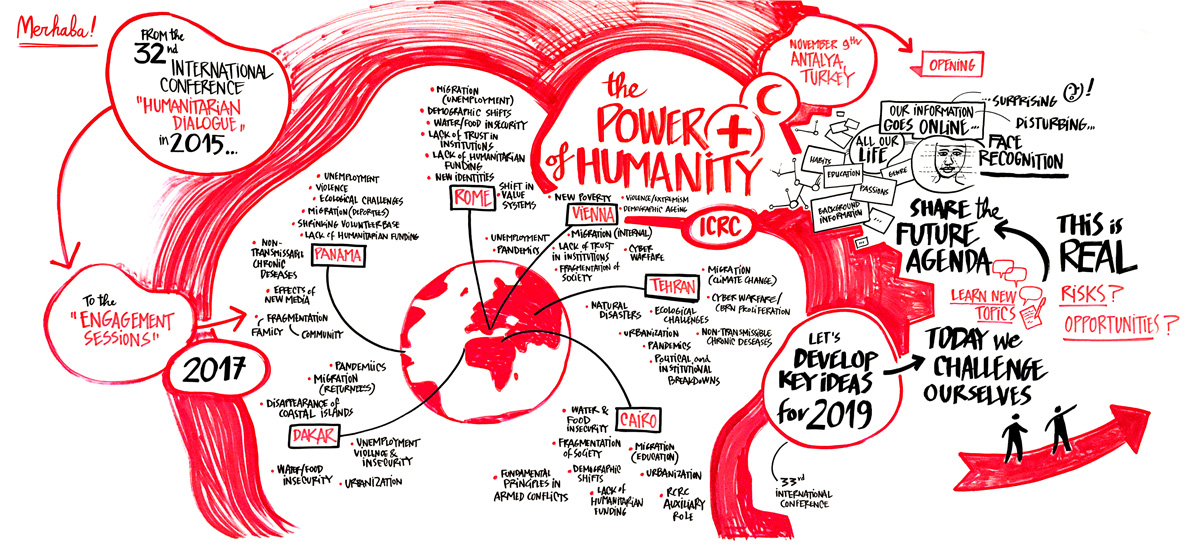Key outcomes of the RC² Forum sessions:
Agenda and Speakers
Background
In today’s rapidly changing environment, mega trends and disruptions have the potential to affect people and shape the way the humanitarian sector will work in the future: artificial intelligence, digital disruption, protracted conflicts, raise of populism, changing humanitarian financing, robotics and demographics changes are only a few examples.
The 2017 Statutory Meetings included one day for the Movement components to learn from each other, share experiences and discuss, under the overarching theme of futures and innovations. The RC² Forum inspired discussions on current and future dilemmas and their potential solutions, allowing the Movement to continuously provide relevant services in a changing environment.
Preparatory Process
Regional engagement sessions were organized from March to September 2017 with the purpose of identifying major regional humanitarian challenges and opportunities that might emerge in the future and which the Movement should anticipate for. This engagement process will influence the agenda of the RC² Forum that will take place in November 2017 and, ultimately, to the 33rd International Conference.
The engagement sessions took place at regional level and involved 78 National Societies represented by leadership, youth representatives and programme managers. The sessions were mostly hosted by the National Societies of the countries where the meetings took place:
1. Panama City, Panama, 15 March (Spanish): 13 Central and Latin American National Societies: Bolivia, Brazil, Colombia, Costa Rica, Cuba, Dominican Republic, Ecuador, El Salvador, Guatemala, Honduras, Nicaragua, Panama and Peru.
2. Rome, Italy, 7–8 June (English): 14 Central Asian and European National Societies: Azerbaijan, Bosnia and Herzegovina, Denmark, Germany, Ireland, Italy, Kazakhstan, Kyrgyzstan, Montenegro, Norway, Spain, Sweden, Turkey and Turkmenistan. A representative from the Standing Commission of the Red Cross and Red Crescent attended.
3. Cairo, Egypt, 3–4 July (Arabic): 7 Middle Eastern and North African National Societies: Egypt, Iraq, Jordan, Kuwait, Libya, Palestine and Yemen.
4. Vienna, Austria, 20–21 July (English): 17 Central Asian and European National Societies: Albania, Austria, Bulgaria, Cyprus, Estonia, Finland, France, Iceland, Italy, Latvia, Monaco, Romania, Russia, Slovakia, Sweden, Tajikistan and United Kingdom.
5. Tehran, Iran, 28–29 August (English): 9 South and South-East Asian National Societies: Bangladesh, India, Iran, Malaysia, Maldives, Nepal, Sri Lanka, Thailand and Viet Nam.
6. Dakar, Senegal, 12–13 September (French): 17 National Societies of French-speaking Africa: Benin, Burkina Faso, Burundi, Cabo Verde, Côte d’Ivoire, Guinea, Guinea-Bissau, Madagascar, Mauritius, Niger, Republic of the Congo, Rwanda, Sao Tome and Principe, Senegal, Seychelles, Chad and Togo.







